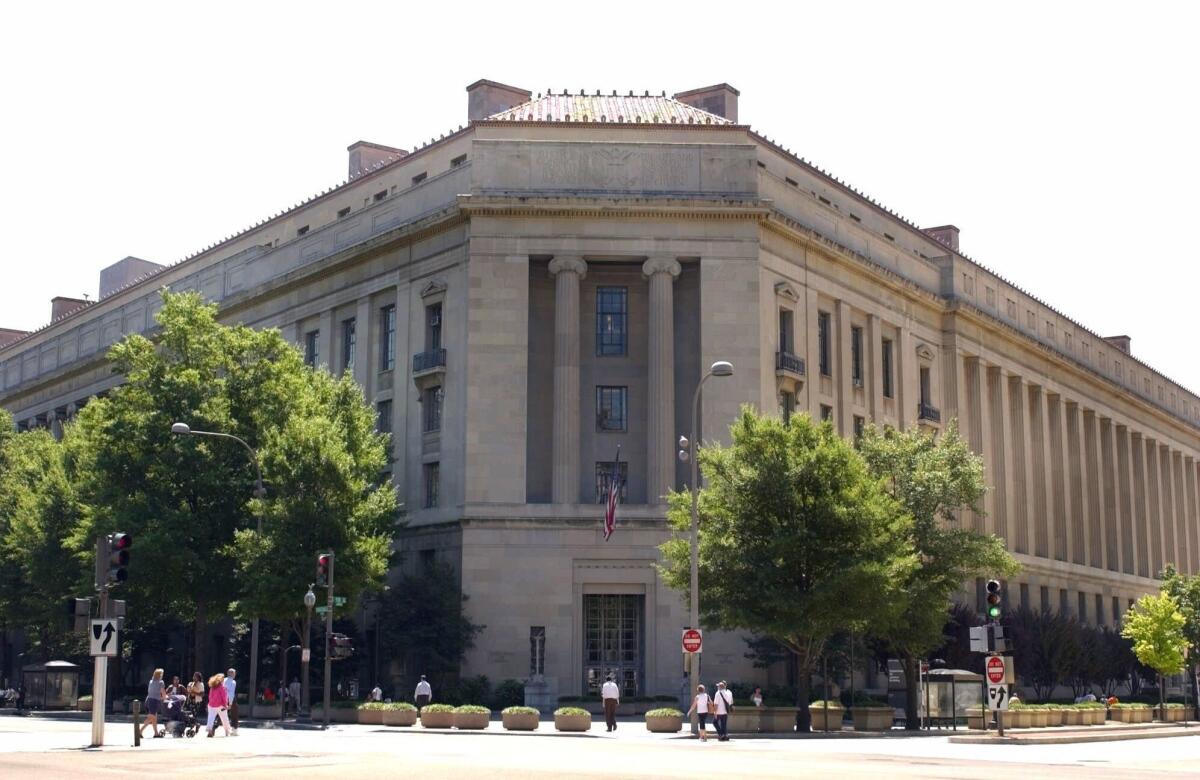Column: The DOJ just made it too easy to link coronavirus to terrorism

- Share via
The Department of Justice sent out a memo last week with this arresting detail: Prosecutors around the country should consider coronavirus as a “biological agent,” and therefore charge certain acts related to COVID-19 as federal crimes of terrorism.
As a former U.S. prosecutor, I have no quarrel with the department’s being able to “make a federal crime” of the worst conduct that we may see with the virus. Among other things, it gives the country a hook to bring federal resources to bear on cases that for whatever reason may be difficult for states to bring.
But the general idea of viewing the coronavirus as a “biological agent” akin to anthrax or botulism, and its “possession” or transmission as a crime of terrorism, is as novel as the virus and it carries its own exponential dangers.
Until now, the core concept of a biological agent in terrorism law is an engineered or synthesized toxin, like anthrax. Shifting that definition to a naturally occurring virus we all can catch and carry, and one we so far know so little about, is not just inapt, it’s overkill. We should confine terrorism crimes to offenses involving violence and intimidation against a large body of civilians in pursuit of political aims.
As are bread and milk, gas and aspirin, alcohol and marijuana, books should be available, with safety precautions in place, at the usual places we buy them in our neighborhoods.
There are legitimate applications of the DOJ’s definition. The paradigm for federal jurisdiction would be cases we’ve recently heard about that the FBI is investigating: Neo-Nazi and white supremacists encouraging members who become infected to spread the disease to police officers and to Jews, whom they view, in the time-honored irrational fashion of anti-Semites, as responsible for the virus.
Life in prison — the sentence for federal crimes of terrorism — seems like fitting punishment for such heinous conduct. But for many other potential coronavirus crimes or civil offenses, what could follow from the “biological agent” rubric is just not right.
There already have been reported instances of people threatening others with the virus. A New Jersey man breathed on someone and then said he had the virus. A woman in a supermarket in Pennsylvania coughed on fresh produce and announced: “I have coronavirus and you are all going to get sick.” She next tried to shoplift a 12-pack of Coors Light. State authorities charged her with two felony counts of terrorist threats and, perhaps with the DOJ in mind, one count of threats to use a “biological agent.”
Antisocial, sad sack criminal conduct? Yes. But domestic terrorism akin to building a bomb and trying to set it off in Times Square?
Or imagine what lawyers would consider the potential “reckless” transmission of the disease. On Monday, Florida authorities arrested the pastor of a local church who held services in contravention of stay-at-home orders.
He was charged with unlawful assembly and violation of public health emergency rules, both second-degree misdemeanors. But combine his recalcitrance with the DOJ’s definition of the virus as a biological agent, and the possible end result is a range of federal felony charges, including, if a parishioner contracts the disease and dies, reckless homicide.
Most panoramically, there could be “negligent” transmission of the virus, not with the intent to harm or even done recklessly, but done without taking proper care nonetheless. This kind of transmission will most certainly occur, tragically, in thousands of cases.
For example, The Times recently reported on a choral group in Washington state that decided to go forward with practice notwithstanding the then-rapid spread of the virus in Seattle. Today, 45 members are infected, three have been hospitalized and two have died. The DOJ’s definition increases the prospects for recovery in a civil case associated with such conduct, along with the likely amounts. It might also push local authorities, who are eager to appear aggressive in combating the coronavirus, toward a charge of criminal liability.
The memorandum from the department doesn’t quite seal the deal on how the law will view coronavirus, but because the department is the agency tasked with administering the criminal code, the courts usually defer to its interpretations. Unfortunately, the memo may serve as a giant step toward making transmission of a disease into chemical warfare and suicide bombs.
There will have to be some reckoning down the line related to COVID-19, some assignment of fault for at least the most culpable transmitters of the disease. The courts might attempt to look to normal principles of everyday liability, including for negligence, as they have done (with notably inconsistent results), in cases of transmission of AIDs. More likely, the immensity and unprecedented nature of the coronavirus threat will require a legislative solution from Congress, involving partial compensation and rough justice.
But it would be a mistake to rely generally on a body of law developed for acts of terrorism to account for the spread of the coronavirus. Confronting the legion problems of the pandemic is daunting enough without reconceptualizing disease as a massive terrorist attack from within.
Harry Litman is a former U.S. attorney and host of the podcast “Talking Feds.” @harrylitman
More to Read
A cure for the common opinion
Get thought-provoking perspectives with our weekly newsletter.
You may occasionally receive promotional content from the Los Angeles Times.











